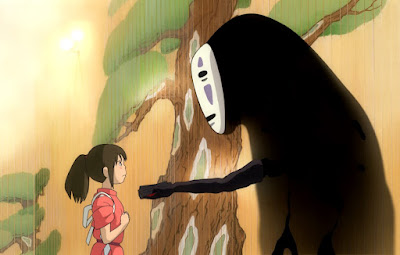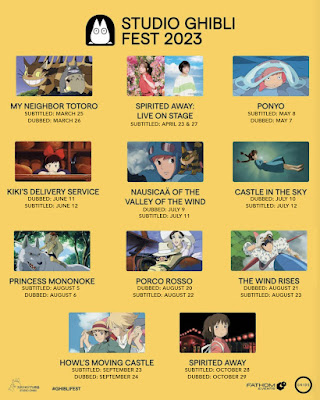Movie Name/Year: Spirited Away (2001)
Genre: Adventure, Animation, Family, Fantasy
Length: 2h 5min
Rating: PG
Director: Hayao Miyazaki
Writers: Hayao Miyazaki
Actors:
- Japanese Language Cast: Rumi Hiiragi, Miyu Irino, Mari Natsuki, Takashi Naitô, Yasuko Sawaguchi, Tatsuya Gashûin, Ryunosuke Kamiki, Yumi Tamai, Yô Ôizumi, Koba Hayashi, Tsunehiko Kamijô, Ken Yasuda
- English Language Cast: Daveigh Chase, Suzanne Pleshette, Jason Marsden, Susan Egan, David Ogden Stiers, Lauren Holly, Michael Chiklis, John Ratzenberger, Tara Strong, Mickie McGowan, Jack Angel, Bob Bergen, Rodger Bumpass, Phil Proctor, Paul Eiding, Jim Ward
Metacritic Blurb: A young girl, Chihiro, becomes trapped in a strange new world of spirits. When her parents undergo a mysterious transformation, she must call upon the courage she never knew she had to free herself and return her family to the outside world.
Cat’s Point of View:
We’ve already reviewed a couple of films from this year’s Studio Ghibli Fest, namely Princess Mononoke (1997) and Howl’s Moving Castle (2004), so I figured why not round this series out with another Studio Ghibli favorite? Spirited Away will hit theaters featuring Ghibli Fest 2023 screenings towards the end of October. (A live stage production already made the rounds as April’s selection. I didn’t even realize there was a stage show until I saw this year’s Ghibli Fest lineup!)
One of the many reasons I adore these Ghibli movies is because so many of them feature a female protagonist - and not in a cliche or cheesy way either. In the case of Spirited Away, this story offers the perspective of a 10-year-old girl as she struggles against the changes in her life she has no control over. I can’t tell you how much I wish that this film had been around when I was 10 and my whole world was changing for both similar and wildly different reasons than young Chihiro in this story.
I had moved away from friends for the 2nd time in as many years, and started a new school on top of that. My family life was in upheaval due to my parents’ separation (pre-divorce) at the time. I had just spent a year with my aunt, uncle, and cousins in an entirely different state than my parents - and they weren’t even in the same state. While I was reunited with my mom as we moved in with my grandparents while looking for a new home of our own, my dad was half the country away in Georgia. It was a rough time.
For that reason, Chihiro’s journey of finding her way without her parents and navigating new places and people really resonated with me on a whole other level from most other Studio Ghibli movies. I understood the young girl’s anxiety, dogged determination, and her fierce protectiveness over the positive connections in her life.
On the other hand, Hayao Miyazaki (Castle in the Sky, Howl's Moving Castle, Ponyo) apparently came up with the story for Spirited Away after witnessing a friend’s 10-year-old daughter’s behavior, and also realizing there weren’t a lot of movies out there for girls in that particular age range. With a few rare exceptions, he prefers to use his imagination to bring messages of positivity to children. The fact that adults also enjoy his work is really just a bonus.
I found an interview with Miyazaki from 2001 that was fascinating and actually blew my mind. I hadn’t realized that Spirited Away didn’t have a formal script. He developed the story as he went along. This man is even more of a phenom and genius than I originally thought. If you are interested in Miyazaki’s creative process or more in-depth insight into this movie, I encourage you to go to the site that is hosting that interview transcript (linked above).
As with other Studio Ghibli works, there are some aspects of Spirited Away that might be slightly disturbing to very small children, but as this movie is supposed to be geared towards the age range of its heroine, it’s fine for generally everyone else.
The animation style remains rich and gorgeous, and the voice talent (at least for the English version - I haven’t seen the subbed Japanese version) is absolutely on point. Fun fact: the voice of Chihiro in the English cast is brought to us by Daveigh Chase (Big Love, Yellow, Transference). She went on to give us the voice of Lilo from the Lilo & Stitch (2002) franchise, as well as the terrifying performance as Samara in The Ring (2002). I digress…
Spirited Away accomplished Miyazaki’s goal of showing young girls that things will be alright and that they are capable of tackling the challenges of life - and then some. I have enjoyed every viewing I’ve had of this film and I look forward to watching it again many more times in the future. This is also one of the several Ghibli films that my daughter enjoys introducing to friends.
Remember, Ghibli Fest 2023 is running through early November, so if you would like to catch a showing of these classic anime movies, check out the schedule through the Fathom Events site.
Rotten Tomatoes Critic Score – 96%
Rotten Tomatoes Audience Score –96%
Metascore – 96%
Metacritic User Score – 8.9/10
IMDB Score – 8.6/10
Trust the Dice: Cat’s Rating – 5/5
P.S. - Just as an extra piece of trivia in clearing up a common misconception stemming from a few of the DVD and blu-ray release editions of some of the Studio Ghibli movies - Disney does not, and has never owned Studio Ghibli. They only had a limited distribution deal with Studio Ghibli, and that expired in 2017 when GKIDS took over the distribution rights.
Movie Trailer:









